 Night and morning dryness in the mouth. Sometimes it is so strong that it can awaken a person, and the wakener often realizes: he woke up from his own snoring.
Night and morning dryness in the mouth. Sometimes it is so strong that it can awaken a person, and the wakener often realizes: he woke up from his own snoring.
Since the mouth in the dream is often ajar, it feels like there is a hot desert in its mouth: the tongue is dry and thick, and moving it away is like moving a sand-hill, the dry throat glows with fire, making the sounds lingering and whistlinglike a burning wind-low in a real desert.
The Persian poet said:
in the mouth dried up the moisture, the mouth is dry:
as the sun scorched barkhan - the tongue,
as the evil Samus - the breath of heat.
Contents
- From the lyrics to the serious problem
- Why does it dry just in the morning and at night?
- Causes external and internal
- Salivary glands: question to the dentist
- Concomitant symptoms and conditions
- Do I need medical help?
- Is it possible to do something at home?
From the lyrics to the serious problem of
The medical term dry mouth( xerostomia) means dehydration of the oral cavity:
- or due to insufficient moistening of its saliva( small amount);
- or due to changes in the properties of the saliva itself.
Either there is saliva in the mouth( and it is enough), but the body perceives the oral cavity as not sufficiently moisturized( due to disruption of the trophism of its mucosa or due to changes in the sensitivity of its receptors).
Why does it dry just in the morning and at night?
The appearance of dry mouth at night and in the morning is easy to explain: at this time salivary glands production of saliva is almost non-occupied, and the 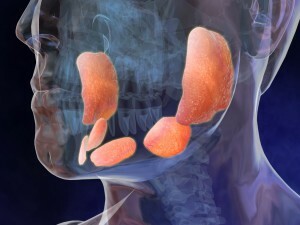 tonus of facial and chewing musculature is noticeably weakened.
tonus of facial and chewing musculature is noticeably weakened.
This often leads to the opening of the mouth and the drying of its mucous membranes by the movement of air - breathing, as well as the heat in the bedroom. The consequence of this is dry mouth mainly in the morning( often passing by itself), the same results lead to the alcohol used the day before.
Nocturnal dryness in the mouth, except for the breathing of the open mouth and overeating at night, can also cause diseases of the nervous system, which disrupt the normal nervous regulation of the salivary glands.
Causes external and internal
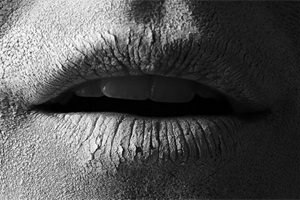 But the state of night and morning dryness can occur not only because of external( due to snoring or breathing open mouth for problems in the nasal cavity or in the nasopharynx).It appears also when the mouth is closed and from the withers it seems to be protected.
But the state of night and morning dryness can occur not only because of external( due to snoring or breathing open mouth for problems in the nasal cavity or in the nasopharynx).It appears also when the mouth is closed and from the withers it seems to be protected.
Then it can occur as a result of internal causes:
- disorders of water and electrolyte balance of the body;
- changes( increases) in osmotic blood pressure;
- intoxication( both internal and external);
- disorders of nervous and humoral mechanisms regulating the production of saliva.
These disorders develop on the basis of:
- of prolonged action of elevated temperatures( sleep in a hotly heated bedroom, especially if the air in it is excessively dry);
- dehydration both due to an elementary shortage of water consumption, and loss of it( due to prolonged diarrhea or vomiting, because of blood loss or excessive sweating at elevated body temperature);
- of diabetes;
- of habitual intoxications( narcotic, alcoholic, alkaloids of tobacco);
- reception of medicines leading to dehydration( especially the group of hypotensive and diuretics);
- diseases of the nervous system and brain, leading to disruption of salivation control processes( including strokes, Alzheimer's disease and parkinsonism, neuritis of the trigeminal nerve branches);
- diseases of individual digestive organs( including gastritis, hepatitis, pancreatitis, peptic ulcer disease);
- acute infections and purulent diseases;
- acute abdominal pathology requiring surgical treatment( development of perforated ulcer, cholecystitis, appendicitis, intestinal obstruction).

Salivary glands: a question for the dentist
A separate topic for the emergence of xerostomia are dental diseases( pathology of the oral cavity).
To dryness in the mouth can lead not only the pathology of the salivary glands and their ducts, but also this or that condition of the oral mucosa in general.
But still, the most frequent reasons for overdrying in the oral cavity are both inflammatory-degenerative and infectious, autoimmune and oncological diseases of the salivary glands, leading to atrophy of the glandular tissue and a decrease in the production of saliva.
The first group of causes leading to the degeneration of salivary glands include acute and chronic sialadenitis, and the second - infectious parotitis( mumps).
Dry mouth is also one of the manifestations of Sjogren's syndrome having an autoimmune basis, the oncological lesion of the salivary glands can have both an independent and a metastatic nature.
To an insufficient amount of saliva in the oral cavity, the formation of adhesions and strictures of the salivary gland ducts resulting from
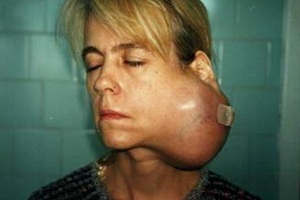
may occur. The oncology of the salivary glands
in their diseases and injuries. The cause of a similar condition can also serve as a loosely-closing lumen of the duct, a small mobile stone-calculus.
To bring a patient with complaints of dry mouth to the dentist's office are also capable of any condition, disease and damage leading to partial or complete atrophy of the oral mucosa, be it tobacco smoking or radioactive irradiation in the oncology process.
Associated symptoms and conditions of
A separate, independent symptom of xerostomia is extremely rare, only as an accidental condition( alcohol intake, overheating and other "disposable" violations of the boundaries of a healthy lifestyle).
With chronic diseases, dry mouth is most often combined:
- with weakness;
- with nausea;
- with bitterness in the mouth;
- with dizziness;
- with frequent urination,
- and also with the symptom of "white tongue".
Therefore, dry mouth can also serve as a diagnostic and differential diagnostic criterion for a number of diseases, conditions and symptoms:
- Xerostomia in combination with bitterness in the mouth ( in case of ingestion of bile) is often a "passport" of problems with the liver,
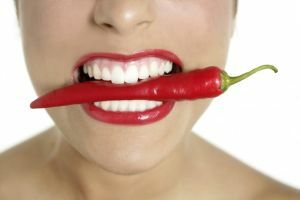 pancreas or bile ducts.
pancreas or bile ducts. - When concomitant giddiness , it may be a symptom of arterial hypotension of various origins or to speak about a serious violation of the blood supply to the brain( due to disease, intoxication, dehydration).
- With " white ", xerostomia is one of the indices of trouble with the stomach( sign of gastritis, stomach ulcers), esophagus( reflux-esophagitis), thin( enteritis, enterocolitis) and colon( colitis), and when combined with a strong andthe growing pain in the abdomen can serve as a sign of the need for urgent surgical intervention.
- The combination of dryness with nausea is less specific than bitterness in the mouth, it can be as one of the signs of intoxication or intestinal infection in favor of which can speak and concomitant diarrhea and vomiting, and symptom of elementary overeating.
- Dry mouth plus constant thirst and rapid urination is almost 100% established diagnosis of diabetes mellitus.
Do I need medical help?
With episodic xerostomia, the causes of which are clear and understandable, the sufferer is unlikely to turn to a doctor for help.
But there is an exception when it is necessary to do it even in cases that do not cause any special inconvenience - pregnancy, because dehydration can threaten the health of not only the future mother, but also the fetus.
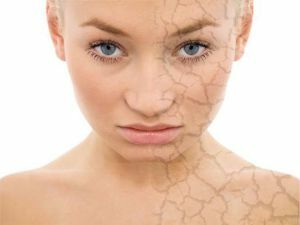 To which specialist should a patient be treated with persistent nocturnal or morning dryness in the mouth?
To which specialist should a patient be treated with persistent nocturnal or morning dryness in the mouth?
This should be a therapist or dentist - a doctor who will offer the necessary studies to find out the cause of the condition being tested, and take decisive measures to eliminate it.
These measures include:
- correction of treatment already underway( replacing, if necessary, some drugs with others, changing the doses and the frequency of medication intake);
- solution of the need for prosthetics and performing operations to correct the process of food processing in the oral cavity;
- consultation of the patient by the doctors of the required profile;
- drawing up recommendations on diet and regimen;
- appointment of psychotherapy, exercise therapy, massage with excessive body weight.
Is it possible to do something at home?
The first thing you need to do is find out under what conditions there is a nocturnal and morning dryness in your mouth and change these conditions:
- by reducing the temperature of the air in the dormitory and saturating it with moisture( at a low level);
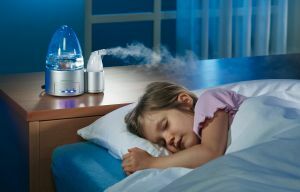
- reviewing the diet( excluding overeating, eating at night, eating dry) and a menu( for excess salt, marinades, spices, smoked foods);
- getting rid of harmful habitual intoxications( alcohol, tobacco), from the abuse of tea and coffee;
- accustomed himself to drinking the daily amount of drinking water necessary for the body( about 2 liters);
- expanding the motor and physical load on the body, applying hardening and immunity-enhancing procedures.
The above measures are a means of preventing one of the varieties of xerostomia - dry mouth in the morning and night.
With all the conditions of a healthy lifestyle, as well as the necessary medical advice to avoid an unpleasant and dangerous condition is quite possible.
